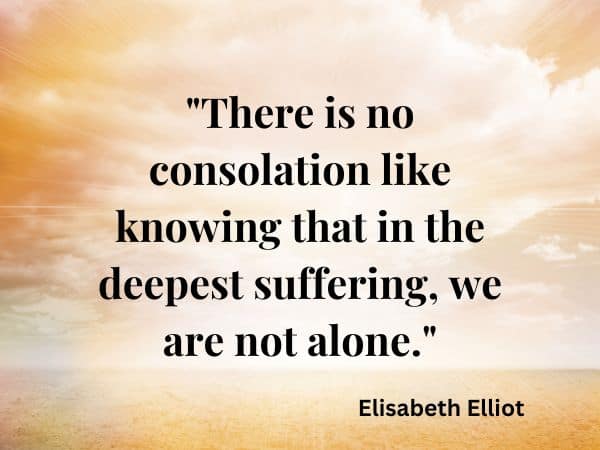Introduction
Elisabeth Elliot’s life and legacy serve as an enduring source of inspiration for Christians worldwide. Born in 1926 in Brussels, Belgium, to missionary parents, Elisabeth grew up with a deep understanding of God’s sovereignty and love. Her life was marked by both immense trials and unshakable faith, shaping her into one of the most influential Christian writers and speakers of her time.
Best known for her missionary work in Ecuador and the loss of her first husband, Jim Elliot, to the Huaorani tribe in 1956, Elisabeth exhibited a remarkable ability to trust God amidst tragedy. Despite her grief, she later chose to live among the same tribe, sharing the love of God with those who had taken her husband’s life. Her experience became the foundation for her groundbreaking book, Through Gates of Splendor.
Throughout her writings, Elisabeth emphasized themes like trusting the will of God, living as a “different kind of woman,” and embracing the deepest spiritual lessons that suffering can teach. In this article, we will explore 50 of the most powerful Elisabeth Elliot quotes, organized into two parts, with reflections to encourage, challenge, and inspire believers to live a life worth living.
Have a look at them. Do you think they are all accurate? Are there any in which you disagree? Much can be gained from her words.
Elisabeth Elliot Quotes Part 1
1. “The will of God is never exactly what you expect it to be. It may seem to be much worse, but in the end, it’s going to be a lot better and a lot bigger.”
The will of God often surprises us with its complexity. Elisabeth’s words encourage us to trust that even when God’s plan appears painful or confusing, His ultimate design will exceed our expectations. It’s an invitation to surrender our limited perspective and trust in His wisdom.
2. “When the time comes to die, make sure that all you have to do is die.”
This quote speaks to living a life of integrity and purpose, ensuring that we face death with peace and readiness. By tying up the loose ends of our lives—through forgiveness, obedience, and faithfulness—we prepare our hearts for eternity.
3. “Leave it all in the hands that were wounded for you.”
Elisabeth reminds us to entrust every worry, burden, and decision to Christ. The hands that bore the scars of the cross are strong enough to carry our struggles, offering comfort and assurance that He understands our pain.
4. “God has promised to supply all our needs. What we don’t have now, we don’t need now.”
This wisdom challenges the modern obsession with “more.” Elisabeth calls us to rest in God’s provision, trusting that He gives us exactly what we need at the right time, and withholding nothing essential for our growth or joy.
5. “The heart set to do the Father’s will need never fear defeat.”
A heart aligned with God’s purposes finds strength and courage, even in the face of apparent failure. Elisabeth’s words remind us that victory is found in obedience, not in worldly measures of success.
6. “It is in accepting what God gives that we are made holy.”
Surrendering to God’s gifts, whether joyful or painful, is a pathway to sanctification. Elisabeth teaches us that by embracing His will, we allow Him to shape us into the image of Christ, reflecting His glory to the world.
7. “Faith does not eliminate questions. But faith knows where to take them.”
Faith does not demand blind acceptance but invites us to bring our doubts and uncertainties to God. Elisabeth reminds us that true faith is not the absence of questions but the presence of trust in the One who holds all answers.
8. “There is no need to fear. God’s love is a perfect love.”
Fear often stems from doubting God’s intentions. Elisabeth’s words encourage us to meditate on the truth of His perfect love, which casts out fear and brings peace in even the most challenging circumstances.
9. “Do the next thing.”
This quote distills Elisabeth’s practical faith into a simple yet profound command. When overwhelmed by life’s uncertainties, focusing on the next step allows us to move forward in obedience, trusting God with the bigger picture.
10. “God’s refusal is His mercy.”
Elisabeth’s perspective on unanswered prayers reframes disappointment as divine protection. His refusals often shield us from harm or redirect us toward something better, reminding us of His greater wisdom and care.
11. “The cross, as it enters the life of a believer, always brings death—not to life, but to self.”
Following Christ requires the painful but necessary process of dying to our selfish desires. Elisabeth’s words challenge us to embrace the cross, trusting that it leads to a richer, more Christ-centered life.
12. “The secret is Christ in me, not me in a different set of circumstances.”
True joy and contentment come not from external changes but from the presence of Christ within us. Elisabeth’s words challenge us to stop chasing the “next big thing” and instead cultivate a deep, abiding relationship with Him.
13. “Of one thing I am perfectly sure: God’s story never ends with ashes.”
Even in the face of devastation, God’s redemptive power turns sorrow into beauty. Elisabeth assures us that no trial or loss is beyond His ability to transform into something meaningful and good.
14. “A quiet heart is content with what God gives.”
Contentment arises from trusting in God’s provision and timing. Elisabeth invites us to cultivate a quiet heart, free from the noise of comparison or dissatisfaction, resting in His sufficiency.
15. “We are women, and my plea is, let me be a woman, holy through and through, asking for nothing but what God wants to give me.”
Elisabeth speaks to the beauty of biblical femininity, encouraging women to embrace their God-given roles with joy and purpose. Her words challenge us to pursue holiness and find fulfillment in His design.

16. “The deepest spiritual lessons are not learned by His letting us have our way in the end, but by His making us wait, bearing with us in love and patience until we are able to honestly pray, ‘Thy will be done.’”
Waiting is often one of the hardest aspects of faith. Elisabeth teaches us that God uses seasons of waiting to refine our trust in Him. The ability to pray “Thy will be done” requires surrender, cultivated in the crucible of patience and perseverance.
17. “God never withholds from His child that which His love and wisdom call good.”
This truth assures us that God’s withholding is not arbitrary. Even when we feel denied, His love is at work. Elisabeth’s perspective challenges us to trust His decisions, knowing that He always acts with our eternal best in mind.
18. “Suffering is never for nothing.”
Elisabeth endured immense personal loss, yet she believed deeply in the redemptive power of suffering. Pain often becomes the soil where God grows our faith, compassion, and reliance on Him, transforming hardship into spiritual treasure.
19. “There is no consolation like knowing that in the deepest suffering, we are not alone.”
The presence of God offers incomparable comfort in the midst of trials. Elisabeth reminds us that even in our darkest moments, His everlasting arms sustain us, providing peace and strength when we feel weakest.
20. “It is not the experiences of life that change us; it is our response to those experiences.”
Life’s trials shape us only when we allow God to work through them. Elisabeth challenges us to respond with faith, humility, and obedience, trusting that God is using every experience to mold us into His likeness.
21. “Nothing I have belongs to me. It’s all God’s.”
Elisabeth’s perspective on stewardship encourages us to view every blessing as a gift from God. When we recognize Him as the source of all we have, we’re freed to live with open hands, ready to share and serve.
22. “We are not meant to see through the fog of the future. We are meant to walk by faith.”
Instead of demanding clarity, Elisabeth calls us to trust God with the unknown. Walking by faith means stepping forward even when the path ahead is unclear, confident that He will guide us.
23. “A Christian life worth living is one marked by surrender, trust, and obedience.”
Elisabeth succinctly defines the essence of discipleship. A life anchored in Christ reflects these core principles, leading to a faith that is vibrant and transformative.
24. “Teach me to treat all that comes to me with peace of soul and with firm conviction that Your will governs all.”
This prayerful quote reminds us that peace comes from accepting God’s sovereignty. Elisabeth encourages us to approach life’s challenges with calm assurance, knowing that His will is perfect.
25. “True faith goes into operation when there are no answers.”
Faith shines brightest in uncertainty. Elisabeth’s words remind us that trusting God doesn’t depend on having solutions but on resting in His character and promises, even when we can’t see the way forward.
Elisabeth Elliot Quotes Part 2
26. “The love of God is demonstrated in His willingness to forgive, restore, and transform.”
God’s love is active, not passive. Elisabeth points to the transformative nature of His love, which redeems our brokenness and empowers us to live in His grace.
27. “One does not surrender a life in an instant. That which is lifelong can only be surrendered in a lifetime.”
Surrender is not a one-time act but a daily commitment. Elisabeth teaches us that following Christ requires continual choices to lay down our will and embrace His, deepening our trust in Him over time.
28. “You can never lose what you have offered to Christ.”
What we entrust to God gains eternal significance. Elisabeth’s words encourage us to hold nothing back, knowing that anything given to Him is secure and will bear fruit for His kingdom.
29. “Worry is the antithesis of trust. You simply cannot do both.”
This quote challenges us to examine our hearts. Worry reveals a lack of trust in God’s control, while faith invites us to rest in His care. Elisabeth calls us to choose trust over anxiety.
30. “The discipline of the waiting life is far more than waiting for something to happen—it is waiting for the One who holds our future.”
Waiting becomes meaningful when it’s focused on God rather than outcomes. Elisabeth reframes waiting as an opportunity to deepen our relationship with Him, aligning our hearts with His timing and purposes.
31. “The word of God is a straight edge that shows up our own crookedness.”
Elisabeth emphasizes the Bible’s role in revealing our sin and need for grace. Like a ruler, God’s Word provides an unchanging standard against which we can measure our lives. This awareness invites us to rely on His Spirit for transformation.
32. “The secret of joy is Christ in me—not me in a different set of circumstances.”
Elisabeth highlights that true joy is not tied to external situations but to the presence of Christ within us. Chasing circumstances for happiness is futile; instead, we find lasting joy by nurturing a deep relationship with Him.
33. “There is nothing worth living for unless it is worth dying for.”
This powerful statement challenges us to evaluate what truly matters in our lives. Elisabeth encourages believers to pursue eternal values—faith, love, and service—over fleeting worldly pursuits, as these hold lasting significance.
34. “To love God is to love His will. It is to wait quietly for life to be measured by One who knows us through and through.”
Elisabeth calls us to find peace in trusting God’s will, even when it is difficult to understand. Loving His will requires surrender, resting in the knowledge that He knows us completely and acts with perfect wisdom.
35. “God’s story is bigger than anything we can imagine, and it is never finished until He says it is.”
Even when life feels chaotic or incomplete, Elisabeth reminds us that God’s narrative is far grander than we can grasp. His redemptive work continues beyond what we see, calling us to trust in His eternal plan.
36. “We pray that we may be made like Christ, and then we think it strange when we are given the opportunity to suffer as He did.”
Becoming like Christ often involves walking through suffering. Elisabeth points out our tendency to resist the very process that molds us into His image. Suffering becomes a tool in the hands of a loving God.
37. “Fear arises when we imagine that everything depends on us.”
Elisabeth identifies the root of fear as a misplaced sense of control. When we release the burden of self-reliance and trust God’s sovereignty, fear loses its grip, and peace takes its place.
38. “Discipline is the believer’s response to the grace of God.”
Elisabeth views discipline not as a burden but as a joyful response to God’s grace. It reflects gratitude and love, shaping our lives to honor Him and to grow in holiness.
39. “There is always enough time to do the will of God.”
This quote dismantles the lie of busyness. Elisabeth reminds us that God equips us with the time, energy, and resources to accomplish what He has called us to do. Prioritizing His will ensures we live a meaningful and balanced life.
40. “The cross means suffering. Suffering’s purpose is to teach us to trust God.”
The cross represents the cost of discipleship, and Elisabeth reminds us that suffering is often the means by which we learn to depend wholly on God. Trust grows through trials, deepening our relationship with Him.
41. “God’s refusal to answer our prayers as we wish is not His rejection—it is His redirection.”
Elisabeth reframes unanswered prayers as divine guidance. His “no” often points us toward something better, teaching us to align our desires with His will and to trust His perfect plan.
42. “Faith’s most severe tests come not when we see nothing but when we see a stunning array of evidence that seems to prove our faith vain.”
Elisabeth acknowledges that faith is hardest when circumstances tempt us to doubt. In these moments, we are called to cling to God’s promises, trusting that His unseen purposes are still at work.
43. “The willingness to suffer is part of being a follower of the crucified Christ.”
Discipleship involves embracing both the joys and the costs of following Jesus. Elisabeth’s words challenge us to view suffering as a natural part of our faith journey, one that draws us closer to Christ.
44. “The will of God is never exactly what we would choose, but it is always better than what we would choose.”
Elisabeth reminds us that God’s will often defies our expectations. Yet, in trusting Him, we find that His plans surpass anything we could have imagined for ourselves.
45. “A life of reckless abandon to God is a life full of purpose and meaning.”
Living fully surrendered to God brings unparalleled freedom and fulfillment. Elisabeth’s words encourage us to embrace this reckless abandon, trusting that a life devoted to Him is the most worthwhile pursuit.
46. “God’s ways are higher than ours, and His timing is always perfect.”
This quote reminds us of God’s sovereignty and wisdom. Elisabeth invites us to trust in His perfect timing, knowing that His ways lead to our ultimate good, even when we don’t understand them.
47. “His everlasting arms carry us through the darkest nights and brightest days.”
God’s unfailing support is a source of comfort and strength. Elisabeth’s words encourage us to rest in His everlasting love, knowing He is faithful in every circumstance.
48. “The happiest way to do anything is to do it for God.”
When our work is offered to God, even mundane tasks become meaningful acts of worship. Elisabeth invites us to find joy in serving Him, making every moment an opportunity to glorify Him.
49. “Holiness is not a feeling; it is the end product of obedience.”
Elisabeth grounds holiness in action rather than emotion. True sanctification comes through consistent obedience to God’s Word, regardless of how we feel in the moment.
50. “He is no fool who gives what he cannot keep to gain what he cannot lose.”
This iconic quote, originally from Jim Elliot, encapsulates the heart of Elisabeth’s teachings. It calls us to prioritize eternal treasures over temporary gains, living with a perspective rooted in God’s kingdom.
Conclusion
Elisabeth Elliot’s words challenge us to live lives of faith, surrender, and purpose. Her reflections on suffering, trust, and the will of God offer a roadmap for navigating life’s complexities with grace and courage. Through her own experiences of loss and redemption, she modeled a life fully devoted to Christ.
The 50 Elisabeth Elliot quotes explored here remind us that the Christian life is not without trials, but it is full of meaning when lived in obedience to God. Whether calling us to embrace suffering, trust His provision, or pursue holiness, Elisabeth’s insights continue to inspire believers to live with eternal perspective.
May these quotes serve as a beacon of encouragement, guiding you toward a deeper trust in God and a life of greater faithfulness. As Elisabeth so often emphasized, it is only in surrendering to the will of God that we find true joy and fulfillment.





Leave a Reply